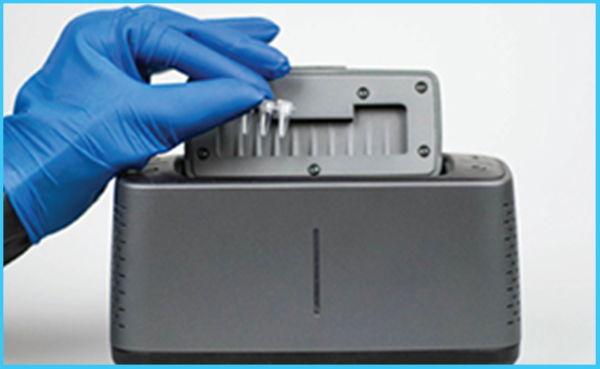
In a breakthrough for SARS-CoV-2 diagnostics, MRIGlobal played a crucial role in research on the design, development, testing, and validation of a multiplex panel that detects five major concern variants – Alpha, Beta, Gamma, Delta, and Omicron – on a portable platform. This advancement will enable extended availability of rapid, accessible, and portable genotyping capabilities to low-resource settings worldwide. The assays provide quick results, can be stored at room temperature, and are utilized on handheld PCR devices.
Despite the production of hundreds of different tests from manufacturers around the world, testing demands and genotyping needs in response to the SARS-CoV-2 pandemic have not been met due to high demand and limited availability, especially in more remote areas of the world. Further, the equipment and expertise required to genotype isolates via whole genome sequencing makes this capability entirely out-of-reach in many low-resource locations. Delayed test results have also made it difficult to determine the best course of treatment in a timely manner, and further delay the tracing and isolation of infected persons to prevent secondary transmissions. Each of these barriers – access, quantity, and testing delays – has resulted in increased disease among more people, prolonging the pandemic.
In addition, the emergence of variants has further complicated testing capabilities. These variants have acquired mutations conferring phenotypes such as increased transmissibility or virulence, or causing diagnostic, therapeutic, or immune escape.
As a result, the past few years have clearly demonstrated the demand for rapid and accurate genotyping PCR assays that can reach more people and be performed in less complex settings. Development, testing, and validation of this panel that detects five major variants of concern on a portable PCR platform now addresses this need.
Because these assays are highly portable and can be used anywhere, they will help increase the availability of genotyping tests in remote areas, where testing may have previously been limited or non-existent. Rapid and accessible testing will also support quick decision making with respect to public health measures and treatment options for individual patients, potentially saving lives.
The rapid identification of prevalent variants without having to wait days to weeks for sequence data is paramount in supporting public health measures. There are also distinct advantages to using SARS-CoV-2 variant genotyping assay as a screening tool. Among them, PCR is incredibly less complex, cheaper, and has a faster turnaround time from sample to results compared to sequencing, and not all testing sites can perform sequencing. A PCR panel can be a better alternative for identifying variants rapidly. A genotyping panel can also be especially useful in resource limited settings, as sequencing is not done at the same level in all locations or countries, and many places are not able to do sequencing at all. Further, a panel that can detect variant markers would be ideal for wastewater monitoring, as it may be difficult to sequence the genome due to sample quality. The variant panel can also be a useful and cheaper alternative for other environmental testing and contamination/decontamination verification and all types of non-clinical uses.
By: MRIGlobal